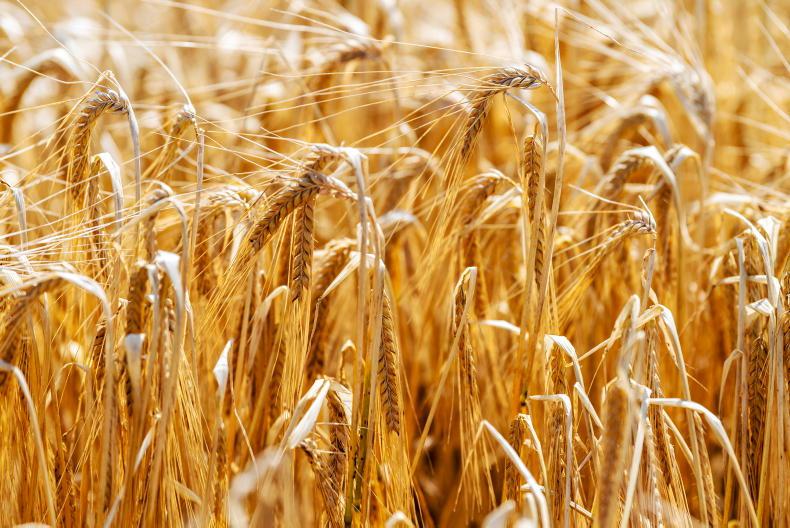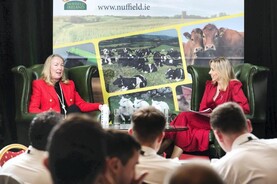The Irish Farmers' Association (IFA) has welcomed Wednesday’s vote in the European Parliament to move forward with a regulation allowing the use of gene editing for breeding new, more-efficient crop varieties.
In trilogues, MEPs will seek a two-tier approach to regulating these new varieties, with their use remaining banned in organic systems and with no patents on genetic material to protect the farmers using them.
IFA grain chair Kieran McEvoy maintains the proposals will leave farmers better prepared for the challenges they will face in the coming years.
“New challenges - such as pests, disease resistance and perhaps, most significantly, climate change - continue to pose a threat to crop yields and quality,” McEvoy said.
“It is vital farmers have access to crop varieties produced by the latest plant breeding technologies in order to try and overcome these challenges.”
McEvoy also commented that the announcement on Tuesday that European Commission president Ursula von der Leyen would seek the scrapping of Brussels’ proposed sustainable use of pesticides regulation (SUR) should act as a learning exercise for the Commission.
“From its inception in June 2022, the SUR proposed unworkable pesticide reduction targets, with an absence of viable biological alternatives and with a lack of meaningful consultation with farmers and other pesticide users,” he added.
“If there is one learning from this outcome, it’s that policy makers have to engage fully before bringing new regulations forward.”
Slammed by EU organics group
The EU-wide organics group IFOAM Europe claims that the gene-editing proposals weaken biosafety requirements for gene-edited plants, but recognised that there will be some “minimum transparency requirements” for new varieties obtained with the process.

The largest EU organics group does not support the European Parliament's position on gene editing, citing "biosafety" concerns. \ Andy Gibson
President of IFOAM Europe Jan Plagge argued that MEPs’ votes were “full of contradiction”, as the proposal acknowledges “major issues” with deregulation, such as patent right challenges, but fails to provide “concrete solutions” to these issues.
Plagge warned that new genomic techniques (NGT) leave “farmers and breeders exposed to corporate takeover of genetic resources through patents”.
“National governments should first provide a legal solution to protect breeders and farmers from patents and to protect the integrity of organic and conventional GMO-free production, before moving ahead with weakening biosafety requirements,” he said.
Young farmers welcoming
Vice-president of the EU young farmers’ umbrella group CEJA Rudolfs Pulkstenis stated that while gene editing is “no silver bullet”, it will become a “significant valuable resource” to farmers.
“As farmers confront increasingly urgent challenges to adapt to climate change, sustain food production and ensure the profitability of their activity, it is encouraging to witness EU’s progress to allow NGTs,” the young farmer said.
“Farmers are expressing frustration at inadequate working conditions and seek additional tools to tackle agricultural challenges. NGTs are no silver bullet, but certainly a significant valuable resource.”
CEJA also commented that while the proposals do not allow for NGTs to be used in organic farming for the time being, they do leave the possibility open that organic farmers may some time be able to avail of the varieties.
Read more
MEPs back gene-edited seed but without patents
The Irish Farmers' Association (IFA) has welcomed Wednesday’s vote in the European Parliament to move forward with a regulation allowing the use of gene editing for breeding new, more-efficient crop varieties.
In trilogues, MEPs will seek a two-tier approach to regulating these new varieties, with their use remaining banned in organic systems and with no patents on genetic material to protect the farmers using them.
IFA grain chair Kieran McEvoy maintains the proposals will leave farmers better prepared for the challenges they will face in the coming years.
“New challenges - such as pests, disease resistance and perhaps, most significantly, climate change - continue to pose a threat to crop yields and quality,” McEvoy said.
“It is vital farmers have access to crop varieties produced by the latest plant breeding technologies in order to try and overcome these challenges.”
McEvoy also commented that the announcement on Tuesday that European Commission president Ursula von der Leyen would seek the scrapping of Brussels’ proposed sustainable use of pesticides regulation (SUR) should act as a learning exercise for the Commission.
“From its inception in June 2022, the SUR proposed unworkable pesticide reduction targets, with an absence of viable biological alternatives and with a lack of meaningful consultation with farmers and other pesticide users,” he added.
“If there is one learning from this outcome, it’s that policy makers have to engage fully before bringing new regulations forward.”
Slammed by EU organics group
The EU-wide organics group IFOAM Europe claims that the gene-editing proposals weaken biosafety requirements for gene-edited plants, but recognised that there will be some “minimum transparency requirements” for new varieties obtained with the process.

The largest EU organics group does not support the European Parliament's position on gene editing, citing "biosafety" concerns. \ Andy Gibson
President of IFOAM Europe Jan Plagge argued that MEPs’ votes were “full of contradiction”, as the proposal acknowledges “major issues” with deregulation, such as patent right challenges, but fails to provide “concrete solutions” to these issues.
Plagge warned that new genomic techniques (NGT) leave “farmers and breeders exposed to corporate takeover of genetic resources through patents”.
“National governments should first provide a legal solution to protect breeders and farmers from patents and to protect the integrity of organic and conventional GMO-free production, before moving ahead with weakening biosafety requirements,” he said.
Young farmers welcoming
Vice-president of the EU young farmers’ umbrella group CEJA Rudolfs Pulkstenis stated that while gene editing is “no silver bullet”, it will become a “significant valuable resource” to farmers.
“As farmers confront increasingly urgent challenges to adapt to climate change, sustain food production and ensure the profitability of their activity, it is encouraging to witness EU’s progress to allow NGTs,” the young farmer said.
“Farmers are expressing frustration at inadequate working conditions and seek additional tools to tackle agricultural challenges. NGTs are no silver bullet, but certainly a significant valuable resource.”
CEJA also commented that while the proposals do not allow for NGTs to be used in organic farming for the time being, they do leave the possibility open that organic farmers may some time be able to avail of the varieties.
Read more
MEPs back gene-edited seed but without patents








 This is a subscriber-only article
This is a subscriber-only article










SHARING OPTIONS: